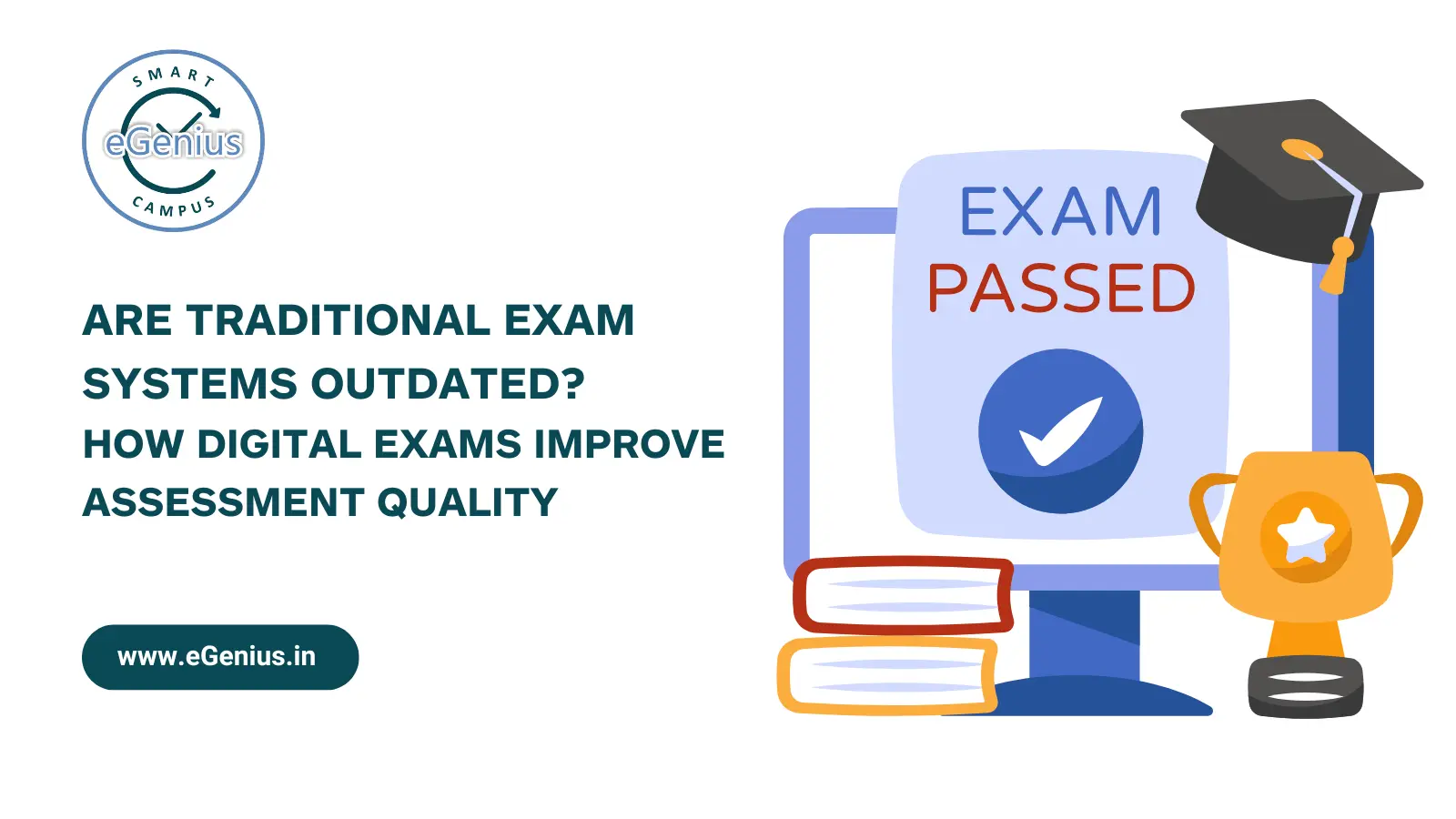In the world of education, change is inevitable, and one of the most significant shifts happening today is the move from traditional paper-based exams to digital exams. Traditional exams, with their time-consuming nature and limited feedback, have been the norm for decades. However, as technology advances, educators are recognizing the benefits of switching to digital platforms for assessments. Digital exams are transforming how students are evaluated, offering quicker results, greater flexibility, and a more secure and streamlined experience.
This blog explores the growing trend of digital exam, why they might be better than traditional methods, and how they are improving the quality of assessments across the globe. Let’s dive into the future of assessments and discover the key advantages digital exam bring to the table.
Introduction: The Shift from Traditional to Digital Exams
In today’s world, we rely more and more on technology to make life easier. One area that is seeing a big change is the way we assess students. Traditional exams, where students sit in classrooms with paper and pens, are slowly being replaced by digital exams. But why is this shift happening, and how do digital exams actually improve the quality of assessment? In this blog post, we will explore how digital exams are changing the game and why they might just be the future of education.
The Limitations of Traditional Exam Systems
While traditional exams have been around for a long time, they are not perfect. Let’s take a look at some of the main problems with traditional exam systems:
Time-Consuming and Stressful: For many students, traditional exams can be stressful. The process of writing down answers on paper, managing time, and worrying about mistakes can make it harder for students to perform well. Plus, grading these exams can take days or even weeks, leading to delays in getting results.
Limited Feedback: In traditional exams, feedback is often limited. Students receive their grades, but they may not understand why they made certain mistakes or how to improve. This makes it harder for them to learn and grow from the experience.
Environmental Impact: Paper exams not only take up time but also resources. Thousands of sheets of paper are used every Instant year, and this contributes to deforestation and waste. In the long run, traditional exams can have a negative impact on the environment.
Check out our new blog on Classroom Management for tips on how to effectively manage your classroom while integrating digital tools to enhance learning experiences.
What Are Digital Exams?
So, what exactly are digital exams? Simply put, digital exams are assessments taken on computers or digital devices rather than using paper and pen. These exams can be conducted online or on a computer at a test center. They can include multiple-choice questions, essays, or even interactive tasks that assess students in different ways.
How Digital Exams Improve Assessment Quality
Now that we know what digital exams are, let’s explore how they actually improve the quality of assessments:
Faster Results and Feedback: One of the biggest advantages of digital exams is how quickly students can receive their results. With traditional exams, teachers have to grade each paper manually, which takes time. But with digital exams, results can be automatically graded, and students can see their scores almost immediately. This not only reduces anxiety but also helps students identify areas for improvement quickly.
Flexibility and Convenience: Unlike traditional exams, digital exams can be taken from anywhere with an internet connection. Students don’t have to travel to a specific exam center, and they can take exams at times that suit them best. This flexibility is especially useful for students who have busy schedules or live far from exam centers.
Enhanced Security: Digital exams are often more secure than traditional paper-based exams. They can be monitored in real-time, and advanced tools can prevent cheating. For example, students may be required to use facial recognition or other identification methods to ensure that the right person is taking the exam. This added layer of security ensures the integrity of the exam results.
The Future of Exams: Digital and Beyond
The trend towards digital exam is only growing. Many schools and universities are already making the switch, and it’s likely that we will see even more schools adopt this technology in the future. As technology continues to evolve, we may even see new forms of assessment that go beyond what we can imagine today.
In conclusion, traditional exam systems, while not entirely outdated, have many limitations that make them less ideal for today’s fast-paced, tech-driven world. Digital exam provide faster results, better feedback, and greater flexibility, making them a more effective way to assess students. As technology continues to improve, it’s clear that digital exam will play a big role in shaping the future of education.
FAQs:
1. What are digital exams?
Digital exams are assessments taken on computers or digital devices instead of using paper and pen. These exams can be completed online or on a computer at a test center.
2. How do digital exam improve assessment quality?
Digital exam improve assessment quality by offering faster results, instant feedback, flexibility in scheduling, and enhanced security through advanced monitoring systems.
3. Is digital exam more secure than traditional exam?
Yes, digital exam is often more secure as they can be monitored in real-time, and technology can prevent cheating through features like facial recognition and ID checks.
4. Do digital exam provide instant feedback?
Yes, one of the main advantages of digital exam is the ability to provide instant feedback. Automated grading allows students to see their results immediately after completing the exam.
5. Are digital exams environmentally friendly?
Yes, digital exams are more environmentally friendly than traditional paper exams because they reduce the need for paper and physical resources, helping to reduce waste and deforestation.
Ready to switch to digital exams and enhance your institution’s assessment process? Discover how eGenius can help you streamline digital assessments with advanced features like instant feedback, security, and flexibility.















